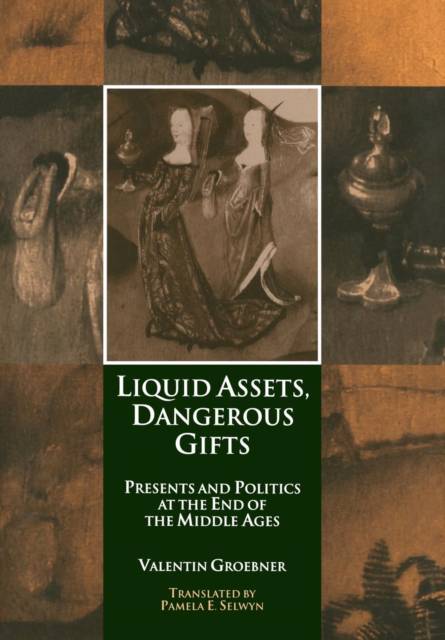
- Retrait gratuit dans votre magasin Club
- 7.000.000 titres dans notre catalogue
- Payer en toute sécurité
- Toujours un magasin près de chez vous
- Retrait gratuit dans votre magasin Club
- 7.000.0000 titres dans notre catalogue
- Payer en toute sécurité
- Toujours un magasin près de chez vous
Liquid Assets, Dangerous Gifts
Presents and Politics at the End of the Middle Ages
Valentin GroebnerDescription
In this book Valentin Groebner addresses the notions and practices of gift giving in late medieval and early modern Europe between 1400 and 1550. Focusing on the prosperous cities of the Upper Rhine, it explores the uses of gifts in political ritual and the different functions of these donations. Contemporaries spoke of these gifts--sometimes wine, sometimes coins or other precious metals--as liquid; indeed, the same German word was used for giving a present or pouring a fluid. These gifts were integral parts of an economy of information marking complex differences and dependencies in social status and hierarchy. The gifts were meticulously recorded and governed by strict social codes, yet the terminology and traditions of gift exchange in this period betray deep-seated ambivalence and anxieties about the practice.
When, asks the author, does the distribution of gifts to public officials shift from an openly noted, routinely accepted practice to something clandestine, suspect, and off the record? Already by the end of the fourteenth century, the public gifts had their darker counterparts. References appear to more dangerous gifts, usually associated with the male body: from the hands of the corrupt scribe, to the skin of the venal judge, to the private parts of the body politic. A new vocabulary appears in law books, oath formulas, and polemical writing to refer to simony and usury, to Judas's reward, and to the sin of sodomy--in short, to underhanded and invisible relationships in which liquid gifts and bodily fluids mingled in unspeakable ways. The metaphors coined in the later Middle Ages and early modern period for designating illegal offerings are still with us, from "greasing hands" to the sexualized imagery of corruption. Liquid Assets, Dangerous Gifts explores the late medieval archaeologies of these notions and examines uses of political gifts as highly flexible instruments of control, manipulation, and coercion. Groebner sheds new light upon a phenomenon that to this day possesses the capacity to transform social circumstances.Spécifications
Parties prenantes
- Auteur(s) :
- Traducteur(s):
- Editeur:
Contenu
- Nombre de pages :
- 256
- Langue:
- Anglais
- Collection :
Caractéristiques
- EAN:
- 9780812236507
- Date de parution :
- 13-05-02
- Format:
- Livre relié
- Format numérique:
- Genaaid
- Dimensions :
- 156 mm x 241 mm
- Poids :
- 512 g

Les avis
Nous publions uniquement les avis qui respectent les conditions requises. Consultez nos conditions pour les avis.






